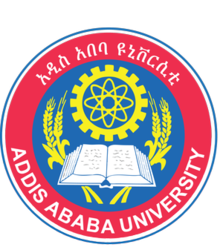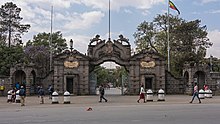Addis Ababa University
@media all and (min-width:720px).mw-parser-output .infoboxwidth:22em
 | |
Former names | University College of Addis Ababa (1950–1962) Haile Selassie I University (1962–1975) |
|---|---|
| Type | State university |
| Established | 1950 |
| President | Professor Tassew Woldehanna |
| Students | 48,673 (2013/14)[1] |
| Location | Addis Ababa, Ethiopia |
| Campus | Addis Ababa (14 campus, including main) |
| Language | English |
| Website | aau.edu.et |
Addis Ababa University (Amharic: አዲስ አበባ ዩኒቨርሲቲ) is a state university in Addis Ababa, the capital of Ethiopia. The university was originally called the University College of Addis Ababa in 1950 and was later renamed Haile Selassie I University in 1962 after the Ethiopian Emperor Haile Selassie I. The institution received its current name in 1975.
Contents
1 History
2 Campuses and colleges
3 Notable alumni
4 References
5 Further reading
6 External links
History

Front entrance to Addis Ababa University.
Addis Ababa University was founded as a two-year college in 1950 by a Canadian Jesuit, Dr Lucien Matte, S.J., at the request of Haile Selassie. It began operations the following year. Over the following two years an affiliation with the University of London was developed. The writer and theorist Richard Cummings served as a member of the Faculty of Law in the 1960s.

Emperor Haile Selassie (center) and French Canadian Jesuit, Fr. Lucien Matte, SJ (right) at the University, 1951
As part of their sweeping changes, the Derg ordered Addis Ababa University temporarily closed on 4 March 1975 and dispatched its 50,000 students to the countryside to help build support for the new regime. The university offered its first Master's programs in 1979 and its first PhD programs in 1987.[citation needed]
Three top university administrators resigned their posts in December 2002 in protest against increasing government interference in internal university matters. Government officials wanted the University to change its system of student evaluations to conform to a "gemgema" (self-criticism) system favored by the ruling party.[2]
In 2013/2014, there were 33,940 enrolled undergraduate students, 13,000 graduate students and 1733 PhD students, making a total student body of 48,673.[1]
Campuses and colleges
Addis Ababa University has thirteen campuses. Twelve of these are situated in Addis Ababa, and one is located in Bishoftu, about 45 kilometers away. It also maintains branches in many cities throughout Ethiopia. The government assigns qualified students to these universities upon completion of secondary school.
Associated institutions include the Institute of Ethiopian Studies, founded by Richard Pankhurst.
Colleges
- College of Social Sciences
- College of Humanities, Language Studies, Journalism and communication
- College of Development Studies
- College of Business and Economics
- College of Law and Governance Studies
- College of Education and Behavioral Studies
- College of Natural and Computational Sciences
Skunder Boghossian College of Performing and Visual Arts- College of Veterinary Medicine and Agriculture
- College of Health Sciences
Research and Teaching Institutes
- Academy of Ethiopian Languages and Cultures
- Addis Ababa Institute of Technology
Aklilu Lemma Institute of Pathobiology- Ethiopian Institute of Architecture, Building Construction and City Development
- Ethiopian Institute of Water Resources
- Institute of Biotechnology
- Institute of Educational Research
- Institute of Ethiopian Studies
- Institute of Geophysics, Space Science and Astronomy
- Institute of Peace and Security Studies
- Horn of Africa Regional Center and Environment Network
Schools
- Alle School of Fine Arts and Design
- School of Allied Health Sciences
- School of Commerce
- School of Earth and Planetary Sciences
- School of Information Science
- School of Journalism and Communications
- School of Medicine
- School of Pharmacy
- School of Public Health
- School of Social Work
Yared School of Music- Yoftahe Nigussie School of Theatrical Arts
Former presidents
| Prof. Admasu Tsegaye | (Apr 2011 – Nov 2017) |
| Prof. Andreas Eshete | (Jan 2003 – Mar 2011) |
| Prof. Eshetu Wencheko | (Jun 2001 – Dec 2002) |
| Prof. Mogessie Ashenafi | (Dec 1995 – May 2000) |
| Prof. Alemayehu Tefera | (Mar 1992 – Feb 1993) |
| Dr. Abiy Kifle | (Mar 1985 – Jun 1991) |
| Dr. Duri Mohammed | (Mar 1977 – Mar 1985) (Feb 1993 – Nov 1995) |
| Dr. Taye Gulilat | (Aug 1974 – Feb 1977) |
| Dr. Aklilu Habtie | (Apr 1969 – May 1974) |
| Dej. Kassa Wolde Mariam | (Jul 1962 – Mar 1969) |
| Dr. Lucien Matte | (Sep 1952 – Jun 1962) |
Notable alumni
Abiy Ahmed Ali, Prime Minister of Ethiopia
Asrat Woldeyes, distinguished surgeon, physician, professor, political leader, political prisoner
Merera Gudina, political leader, professor of political science, political prisoner
Berhanu Nega, political leader
Reeyot Alemu, journalist
Meles Zenawi, Former Prime Minister of Ethiopia
Andargachew Tsige, Politician, political prisoner
Isaias Afwerki, President of Eritrea
Yohannes Haile-Selassie, paleoanthropologist
Zeresenay Alemseged, paleoanthropologist
Birtukan Mideksa, judge and first woman opposition political leader
Berhane Asfaw, paleontologist who co-discovered the apparent origin of the genus Homo
Michael Tsegaye, artist and photographer
Hailemariam Desalegn, Former Prime Minister of Ethiopia
Taddesse Tamrat, historian
Merid Wolde Aregay, historian
References
^ ab "AAU at a glance". Addis Ababa University. 28 December 2013. Retrieved 30 October 2014.
^ "Ethiopia: Country Reports on Human Rights Practices: 2002 report", Bureau of Democracy, Human Rights, and Labor, US State Department. Retrieved 9 July 2009.
Further reading
- Teshome G. Wagaw. The Development of Higher Education and Social Change, an Ethiopian Experience. East Lansing, Michigan. Michigan State University Press. 1990.
External links
| Wikimedia Commons has media related to Addis Ababa University. |
- Addis Ababa University official website
- Institute of Ethiopian Studies and the Ethnological Museum
- Contact information for Addis Ababa University, and 28 Ethiopian institutions of higher education in the African Higher Education Database
Coordinates: 9°2′48″N 38°45′33″E / 9.04667°N 38.75917°E / 9.04667; 38.75917

 Clash Royale CLAN TAG#URR8PPP
Clash Royale CLAN TAG#URR8PPP

Comments
Post a Comment